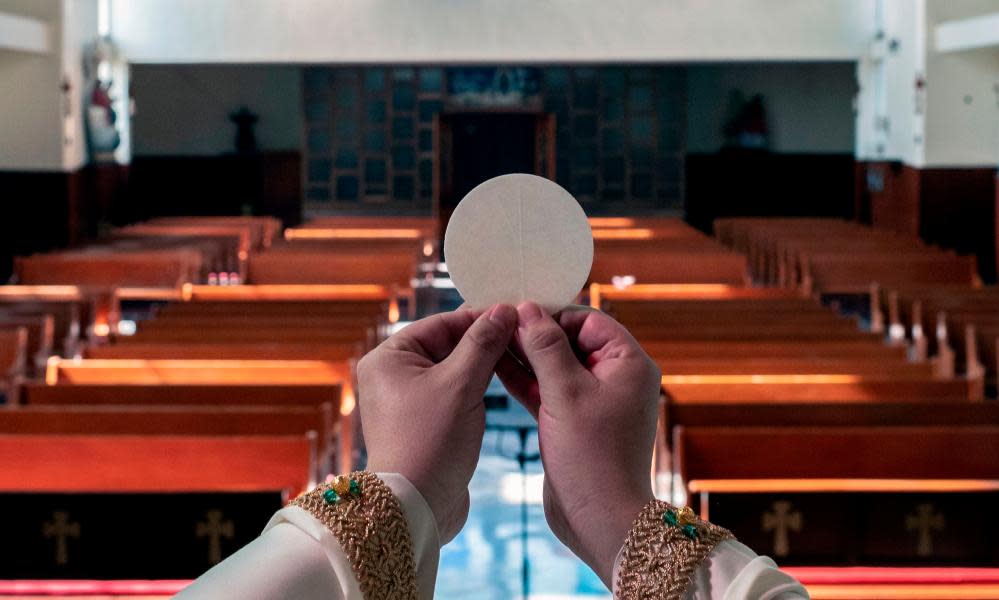'Enter through the back door': secret church services in Mexico and Brazil defy Covid-19 rules

The invitations arrive via text message or social media. “They ask you for a kind of password to let you in,” said Jesús Preciado, whose father has attended the secretive gatherings in the Mexican state of Jalisco.
Diego Martínez, whose mother has attended the backstairs events, said they were off-limits to anyone not in the know. “It’s invitation-only,” he said. “They call you and tell you the place and the date.”
The assemblies into which Preciado, Martínez and thousands of other Mexicans have been sneaking might be organised like illegal dance parties. But they are actually clandestine Catholic masses that have continued to take place in defiance of a coronavirus ban on religious events.
“The bells don’t ring, there are no calls to mass,” said Antonio Hernández, who has watched worshippers steal into secret sessions at the Sagrado Corazón de Jesús church in the town of Ixtapa.
“You just see the people arrive a few minutes before 6.30pm, enter the temple through the back door and then after that you start to hear their prayers,” Hernández added.
The Mexican Episcopal Conference suspended mass in early March, when the first coronavirus cases were reported in Mexico.
Days later the federal government suspended all religious activities involving crowds.
But despite those restrictions – and Mexico’s rising death toll, which now stands at more than 17,000 – the furtive celebrations have continued in the country with the world’s second-largest Catholic congregation and where more than 80% of people identify as Catholic.
Worshippers at the Nuestra Señora de Fátima church in Zacatecas have been allowed into secret masses on the condition they sit behind the camera live-streaming the liturgy on Facebook.
In Jalisco’s capital, Guadalajara, the faithful have continued to frequent the San José y Santo Tomás de Aquino church.
“I went to mass on Sunday, behind closed doors, and there were just 12 of us in the congregation,” said Susana García, a 64-year-old regular.
In Durango state, catechists, choir members and youth leaders have received written notice of the underground rituals. “Only people close to the church go,” said Vicente Martínez, a member of the Catholic community in the city of Gómez Palacios.
Martínez said all churches had been closed there. “But they have hidden activities for 30 or 40 people each Thursday. They do a callout where they describe it as an exclusive and private mass with refreshments after.”
In late May authorities launched a mid-mass raid on one local church, the Nuestra Señora de la Luz, and caught 20 people, mostly elderly women, praying red-handed.
They were expelled and the church’s back door, through which the women had sneaked, was sealed. “[But] they didn’t take any measures against the people inside – not even their temperature,” said Martínez.
Mexico is not the only country in Latin America – a region home to nearly 40% of the world’s Catholics – where Christians have held clandestine celebrations in a time of Covid-19.
In Brazil, home to the world’s largest Catholic congregation and also a rapidly growing and politically powerful community of born-again Christians, evangelicals have also made surreptitious church visits.
“Lift up your hands and shout: ‘I wasn’t chosen to hide myself!’” Pastor Gilvrando Rodrigues shouted at a recent service for about 80 believers at his church in Rio’s biggest favela, Rocinha.
“I won’t accept having to cower in a cave, I won’t accept hiding in a hole because I have a calling from God,” Rodrigues added as he encouraged his flock – most of whom were not wearing face masks – to flout social isolation for their faith.
“You could have stayed at home. But you needed to be here taking care of your salvation,” the preacher said.
Such services have been easier to pull off in Rio than Mexico.
The city’s mayor, Marcelo Crivella, is an evangelical bishop from the Universal Church of the Kingdom of God who, alongside Brazil’s president, Jair Bolsonaro, has been actively pushing for churches to reopen.
Rio’s state governor outlawed religious gatherings in mid-March when a partial shutdown began and a legal tug-of-war has been playing out ever since over whether churches should open, or not.
“It’s all very confused,” said Rodrigues. Last week a judge ruled services could resume.
Bolsonaro, who is heavily reliant on the support of some of Brazil’s most influential televangelists, has defended the right to worship and dismissed the coronavirus as a “little flu” even as his country’s death toll has soared to more than 45,000 – the second-highest tally in the world after the US.
At least 60 of those deaths happened in Rocinha and Rodrigues, who himself contracted the disease early in the pandemic, admitted the virus was no joke.
Related: 'The country is adrift': echoes of Spanish flu as Brazil's Covid-19 catastrophe deepens
“But we can’t stop proclaiming the word of Christ either,” he insisted, calling churches an essential service.
The pastor claimed God had allowed the pandemic, partly in order to help transform the church. Faith had become a commodity, Rodrigues complained.
At a recent Sunday service he told congregants: “You’ve listened to the word and received God’s blessing. And now, whoever would like to pay tribute to the house of the Lord, feel free.
“Those who give, receive,” Rodrigues added, as he asked for help to fund building work on the church. “And those who sow, will reap.”
Some of the names in this report have been changed to protect identities

